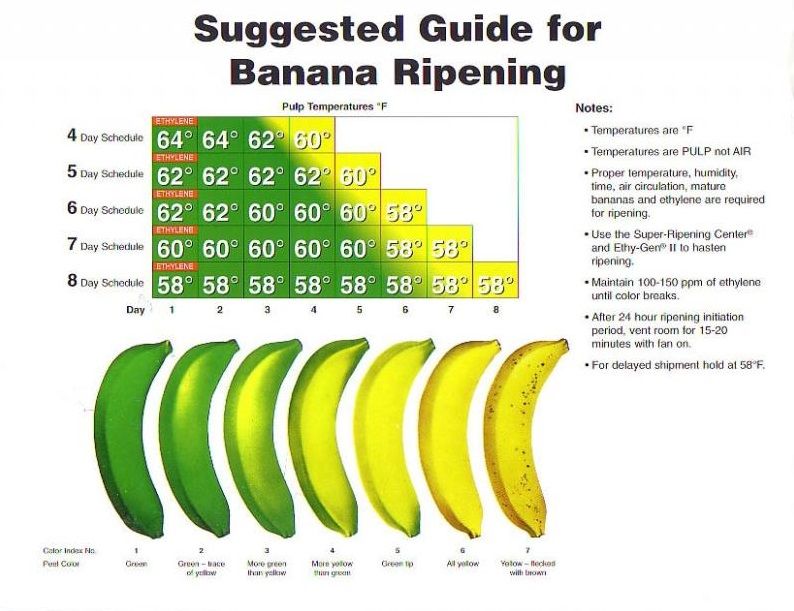How Long Does a Banana Take to Digest: A Comprehensive Guide
Bananas are a popular and nutritious fruit enjoyed by people all around the world. They are known for their sweet taste, creamy texture, and numerous health benefits. One common question that arises is, "How long does a banana take to digest?" In this article, we will delve into the digestive process of bananas and provide you with insights into the time it takes for a banana to be fully digested by the body.

Suggested guide for banana ripening
1. Understanding the Digestive Process
a. Chewing and Saliva Breakdown: The digestion of a banana begins in the mouth. As you chew, your teeth break down the banana into smaller pieces, increasing its surface area for better digestion. Saliva in your mouth also starts to break down carbohydrates present in the banana.
b. Stomach Acid and Enzymes: Once swallowed, the banana enters the stomach, where it encounters stomach acid and digestive enzymes. The acid and enzymes work together to break down the banana further, particularly its proteins.
c. Small Intestine Absorption: After the stomach, the partially digested banana moves into the small intestine. Here, the nutrients, such as carbohydrates, proteins, and fats, are absorbed into the bloodstream for distribution throughout the body. The fiber content of the banana also plays a role in regulating digestion and promoting bowel movements.
d. Large Intestine and Fiber: The undigested fiber in the banana passes through the small intestine and enters the large intestine. In the large intestine, beneficial gut bacteria ferment the fiber, producing short-chain fatty acids and gases. This fermentation process can contribute to gas and bloating in some individuals.
2. Factors Affecting Digestion Time
a. Ripeness of the Banana: The ripeness of a banana can impact its digestion time. Riper bananas with more brown spots tend to be softer and easier to digest compared to greener, unripe bananas.
b. Individual Digestive System: Each person's digestive system is unique, and factors such as age, overall health, and gut microbiota can influence digestion time. Some individuals may have faster or slower digestion rates.
c. Other Foods Consumed: The presence of other foods in the digestive system can affect the digestion time of a banana. Consuming a banana as part of a mixed meal may alter the overall digestion process.
3. Estimated Digestion Time
It is difficult to provide an exact time for the complete digestion of a banana as it varies from person to person. However, on average, it can take anywhere between 30 minutes to 2 hours for a banana to pass through the stomach and small intestine.
4. Tips for Easy Digestion
To promote smooth digestion of bananas or any other food, consider the following tips:
a. Chew Thoroughly: Take your time to chew the banana thoroughly before swallowing. Proper chewing aids in breaking down the food and initiating the digestion process.
b. Pair with Other Foods: To balance the nutrients and aid digestion, consider pairing your banana with other foods, such as yogurt, nuts, or whole grains.
c. Moderation: While bananas are generally easy to digest, consuming them in moderation can help prevent any discomfort or digestive issues.

8 benefits of eating bananas
Bananas are a nutritious fruit that offers various health benefits. Understanding the digestion process of bananas can provide insights into how long they take to digest. While digestion time can vary from person to person, on average, it takes around 30 minutes to 2 hours for a banana to pass through the stomach and small intestine. Remember to chew your bananas thoroughly and consider pairing them with other foods for optimal digestion. Enjoy bananas as part of a balanced diet, and if you have any concerns about your digestion, consult a healthcare professional for personalized advice.